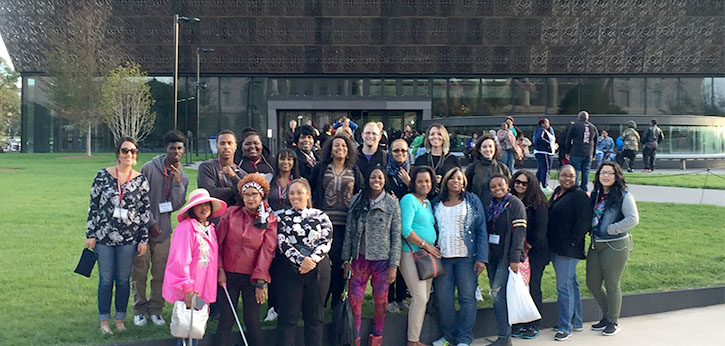From October 11 – 13, IEL convened the last annual meeting of the first five sites of its Right Turn Career-Focused Transition Initiative (Right Turn). After three years pioneering the program, administrators, staff, mentors, and youth from each site gathered in Washington, D.C. to celebrate their success and reflect on the impact it has had on their communities.
The Right Turn model focuses on career development to connect youth who are involved or at risk of becoming involved with the juvenile justice system to comprehensive reentry and transition services. Right Turn sites provide opportunities for education, training, work experiences, mentoring, restorative justice service learning projects, and other developmental activities, as well as supportive services to help youth obtain meaningful employment opportunities and positively reconnect to society.
In 2013, the U.S. Department of Labor, Employment and Training Adminsitration awarded IEL a grant to work with organizations in five communities to implement the Right Turn model. IEL competitively selected Playa Vista Job Opportunities and Business Services (PVJOBS) in Los Angeles; Goodwill Industries of Houston; KentuckianaWorks, The Greater Louisville Workforce Investment Board in Louisville, Ky.; Oasis Center Transitions Program in Nashville, Ten..; and Peckham, Inc. in Lansing, Mich.
At each site, staff work closely with youth participants to develop an Individualized Career Development Plan (ICDP) that covers the three domains of the IEL career development model: self-assessment, career exploration, and career planning and management. This process is meant to first engage participants in identifying their needs, strengths, and interests before choosing the job opportunity that best suits them. Right Turn then supports them in working toward the skills, industry-recognized credentials, and employment experiences that they need to succeed.
“Right now I’m at Lansing Community College working on my nursing degree,” said Eunice, a participant at Peckham. “Right Turn has helped me buy my books, finish paying for my classes, and get my classwork done. My goal is to get in to Georgetown’s midwifery program; that’s how I want to help people in my career.”
As a whole, the five sites met, and in most cases exceeded, program benchmarks and performance measures. With a goal of serving 1000 youth, with at least 90% of those being court-involved), the sites enrolled 1,019 youth ages 14 to 24, with 956 (94%) involved with the juvenile justice system. The holistic nature of Right Turn has yielded an array of powerful outcomes. Eighty-six percent of out-of-school participants ages 18 and above were placed in jobs, postsecondary education, or occupational training, exceeding the grant’s 60% target.
Sites used a number of approaches to support youth in their transition to work. In addition to helping youth develop resumes and prepare for interviews, sites used resources in their local communities. Oasis Center in Nashville enrolled participants in a jobs readiness program held at Tennessee State University. In Lansing, Right Turn connected a participant interested in carpentry to the Grand Rapids Job Corps, which allowed her to complete her high school credits at the same time as taking courses related to her career track. In all, sixty-one percent of youth ages 18 and above received an industry-recognized credential, exceeding the 60% target.
Right Turn provides youth with resources to earn skills and credentials related to high-demand industries in their area. Many sites offer credentialing courses, such as ServSafe for the restaurant industry or Occupational Safety and Health Administration certifification. Other sites use courses offered at outside facilities, such as forklift training. PVJOBS started its own math and technology credentialing program for the mechanical, electrical and plumbing fields, through an innovative collaboration with the American Job Center and the Electrical Training institute.
Right Turn also supports continued education, particularly for participants ages 17 and under. Case managers work with participants to determine educational needs and highlight how completion of a high school credential can help them achieve their career goals. During the grant period, 75% of youth ages 17& under returned to school and 84% of participants ages 17 & under remained in school for 12 months or more. Both measures exceeded the 60% target. Fifty-four percent of youth 17& under received a high school diploma or GED, exceeding the program’s 50% target for this measure.
To assist youth in their academic pursuits, sites offer tutoring and other educational supports. Case managers often help participants with school enrollment and track of youth attendance. Goodwill Industries in Houston developed a program to help Right Turn participants prepare specifically for the Texas state assessments that are required for them to advance to the next grade level. In L.A., one Right Turn youth had such a successful school experience that he was asked to speak at his high school graduation.
One of the clear, tangible outcomes of Right Turn is that the youth are able to build relationships with caring adults in safe spaces. “The youth I work with are not bad kids, they are products of the environment they came up in…They’re looking for a way out, they just don’t know how to get out, and it’s my role to show them the path,” said James, a PVJOBS mentor. Ninety-six percent of program participants received group, peer, or one-to-one mentoring. Mentor relationships served to keep youth engaged with their goals, constructively solve problems, and address transitional issues like family conflicts. Program staff also assist with access to substance abuse treatment, mental health services, social services counselors, housing assistance, child care, and transportation.
In 2015, IEL was awarded another grant to expand Right Turn to four additional sites. This second round of Right Turn sites, running through 2018, are using lessons learned from the first five sites.
